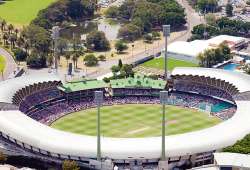The SCG : 100 Tests And Counting
Sydney, Jan 4: When Australia and India took the field for the second test here Tuesday, the Sydney Cricket Ground joined an exclusive club of only three venues to host 100 test matches.Only the 'home'

Sydney, Jan 4: When Australia and India took the field for the second test here Tuesday, the Sydney Cricket Ground joined an exclusive club of only three venues to host 100 test matches.
Only the 'home' of cricket, Lords in London, and the Melbourne Cricket Ground have hosted more, but the SCG can claim to have hosted its fair share of the game's most celebrated moments since its creation in the mid 19th century.
The story of the SCG began in the 1840s when a colonel of the local military barracks made the decision to transform nearby land into a cricket ground, but it wasn't until 1882 that the SCG hosted its first test. Australia, 19 years before officially becoming a unified nation, recorded a five-wicket victory over colonial master England.
The SCG's reputation for being a spin bowlers' paradise dates back to that very first match with off-spinner Joey Palmer bowling Australia to victory with an 11-wicket haul.
Over time the face of the ground changed with new grandstands to house the larger crowds flocking in from a growing city, but the SCG pitch retained its spinning virtues.
Australian cricket greats like Clarrie Grimmett, Richie Benaud and Shane Warne would dismantle opposition batting lineups with the guile of spin over several decades. The 'Sheik of Tweak' Warne claimed his 300th test wicket on the ground, breaking through to bowl South African stalwart Jacques Kallis in 1998.
While spinners have enjoyed the SCG, the ground has also witnessed some incredible feats of batting, including from the greatest batsman of them all — Don Bradman — who scored two centuries at the SCG, including an innings of 234 against England in 1946.
There have been plenty of other moments where willow dominated leather.
In recent times former Australia captain Steve Waugh hit a four off the last ball of the day's play to score a career-prolonging century. That 2003 moment has since been immortalized in a bronze statue outside the ground's dressing rooms, along with other Australian cricketing greats.
Batsman from all over the world have also left their mark on the SCG.
A 23-year-old Brian Lara hit the Australian bowlers all over the park while compiling his 277 in 1993. The feat was so special to the West Indian great he named his daughter Sydney.
A year earlier, a young Indian batsman by the name of Sachin Tendulkar burst on to the test cricket scene with an unbeaten 148 at the SCG, making him the youngest player to score a Test century in Australia.
Tendulkar has been back four times since that test and has scored two more centuries, including an irrepressible double hundred in 2004.
The "Little Master" is just one shy of his 100th international century and at the age of 38 this is likely to be his final opportunity to score an SCG ton. With an average of over 200 at the SCG, there's good reason to believe another chapter of SCG folklore will be written this week.
The appearance of SCG has undergone several changes in its history, most recently the complete redevelopment of the Victor Trumper stand into three tiers in 2008.
This year three more historic stands face overhauls. Prime Minister Julia Gillard and New South Wales state Premier Barry O'Farrell yesterday announced a $186 million upgrade to the Bradman, Noble and Messenger stands to begin after the international cricket season in late February.
While only increasing capacity by 2,500 seats, the redevelopment is aimed at improving spectator comfort and providing the largest video screen at any sports ground in the country.
Many of the Sydney public may see altering the heritage of the ground is akin to sacrilege, but the SCG Trust said in a statement that the famous character of the ground will be retained.
"The new stands are another moment in the ground's evolution," said SCG Trust Chairman Rodney Cavalier.
"The M.A.Noble Stand (circa 1936) is more than 75 years old, the Bradman Stand (circa 1973) and the Messenger Stand (circa 1984) are outdated and offer inferior spectator amenities by modern standards."
"The (new) stands will look like they have always belonged inside one of the world's greatest cricket grounds."